

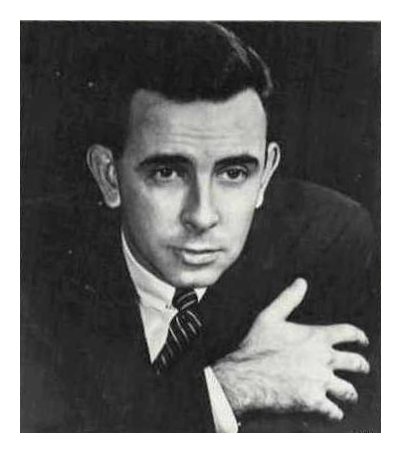 BD: What do you
expect of the audience that comes to see one of your operas, or hear
one of your symphonic works?
BD: What do you
expect of the audience that comes to see one of your operas, or hear
one of your symphonic works?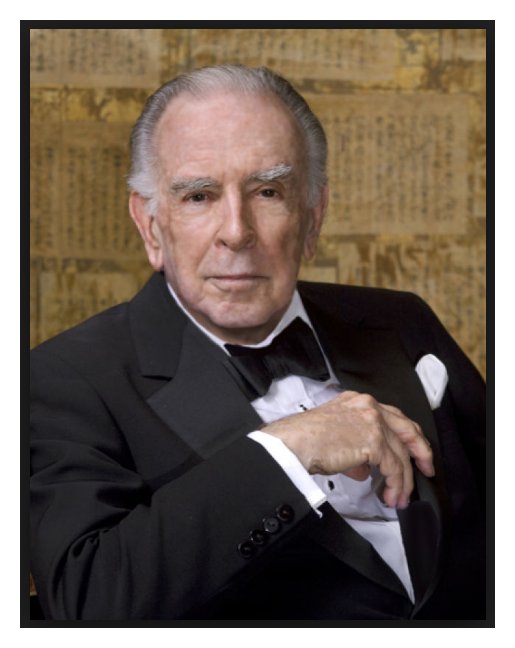 BD: Why do they not
take the time?
BD: Why do they not
take the time?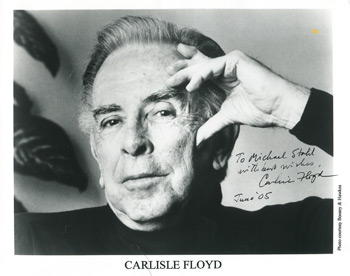 CF: Yup, very much
so. To me, it doesn’t for one minute relax the necessity for
trying to have every word understood on the part of the singers and the
conductor as well as the composer, but, it’s simply there. We
call it a safety net. In case you miss a line, it’s up there, but
if you are forced to read the supertitles constantly, you’re bound to
be distanced emotionally from the stage, and that always concerns me.
CF: Yup, very much
so. To me, it doesn’t for one minute relax the necessity for
trying to have every word understood on the part of the singers and the
conductor as well as the composer, but, it’s simply there. We
call it a safety net. In case you miss a line, it’s up there, but
if you are forced to read the supertitles constantly, you’re bound to
be distanced emotionally from the stage, and that always concerns me. 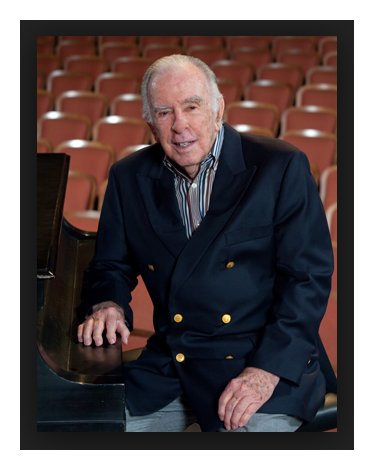 CF: It
depends. On the whole, yes, but almost always with some
reservations. We have such magnificent singing actors in
this country now and for the past two generations. I’ve been very
fortunate in that regard, in having superb realizations of roles.
CF: It
depends. On the whole, yes, but almost always with some
reservations. We have such magnificent singing actors in
this country now and for the past two generations. I’ve been very
fortunate in that regard, in having superb realizations of roles.
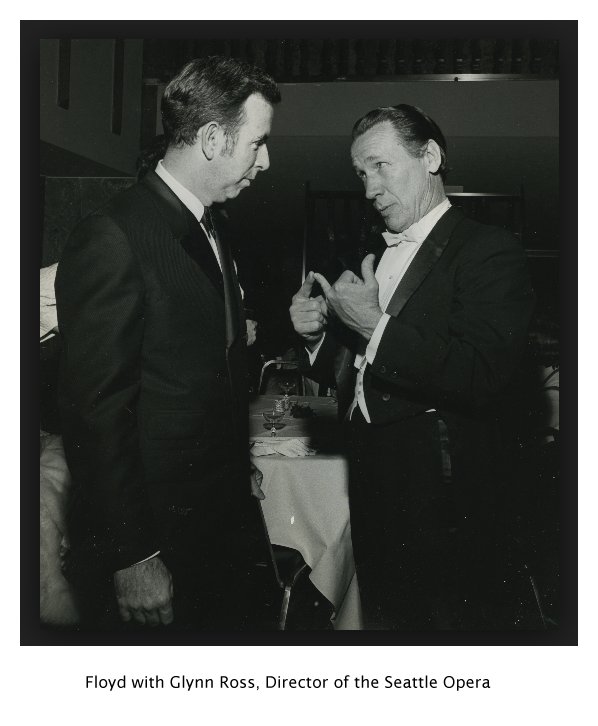 BD: Why can’t more
of that be arranged? Is it just financial considerations?
BD: Why can’t more
of that be arranged? Is it just financial considerations?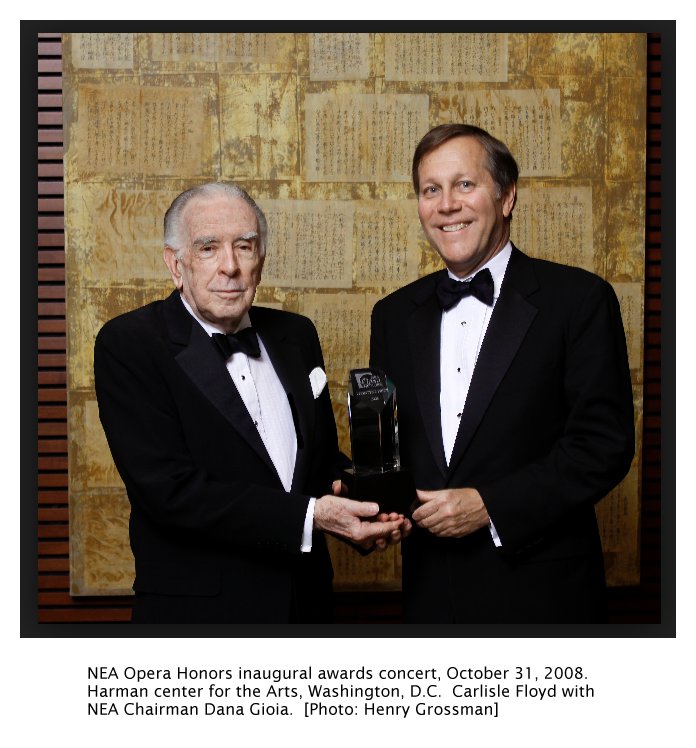 CF: Well, I don’t
know that it’s fun. Yes, it can be fun. It’s very, very
taxing. It takes immense and exhausting concentration, but goes
on like almost any other kind of activity. Unless you are
concentrated every minute, nothing happens. You can practice the
piano for an hour or so and have your mind someplace else, it may not
be as non-productive, but in composition you have to be there every
second or nothing really gets down. It’s exhilarating when things
are going well, and is very trying when things are not. But I
think the first outweighs the second.
CF: Well, I don’t
know that it’s fun. Yes, it can be fun. It’s very, very
taxing. It takes immense and exhausting concentration, but goes
on like almost any other kind of activity. Unless you are
concentrated every minute, nothing happens. You can practice the
piano for an hour or so and have your mind someplace else, it may not
be as non-productive, but in composition you have to be there every
second or nothing really gets down. It’s exhilarating when things
are going well, and is very trying when things are not. But I
think the first outweighs the second. | Carlisle Floyd is one of the
foremost composers and librettists of opera in the United States today.
Born in 1926, Floyd earned B.M. and M.M. degrees in piano and
composition Syracuse University. He began his teaching career in 1947
at Florida State University, remaining there until 1976, when he
accepted the prestigious M. D. Anderson Professorship in the University
of Houston. In addition, he is co-founder with David Gockley of the
Houston Opera Studio jointly created by the University of Houston and
Houston Grand Opera. Floyd’s operas are regularly performed in the US and Europe. He first achieved national prominence with the New York premiere of his opera, Susannah (1953–54), by the New York City Opera in 1956 after its world premiere at Florida State University in 1955. In 1957 it won the New York Music Critic’s Circle Award and subsequently was chosen to be America’s official operatic entry at the 1958 Brussels World’s Fair. Of Mice and Men (1969) is Floyd’s other most often performed work. In the 1998-99 season alone it was presented by New York City Opera, Utah Opera, San Diego Opera, and Cleveland Opera. Based on the Steinbeck novel, it was commissioned by the Ford Foundation and was given its premiere by the Seattle Opera in 1970. Floyd’s more recent operas, Bilby’s Doll (1976) and Willie Stark (1981), were both commissioned and produced by the Houston Grand Opera, the latter in association with the Kennedy Center. A televised version of the world premiere production of Willie Stark opened WNET’s Great Performances series on the PBS network in September of 1981. Floyd's latest opera, Cold Sassy Tree (2000) received its premiere at Houston Grand Opera in April 2000. Subsequently, it has been performed by Austin Lyric Opera, Central City Opera, Lyric Opera of Kansas City, Opera Carolina, Opera Omaha, San Diego Opera, and Utah Opera. The composer has also gained increasing attention for his non-operatic works. 1993 saw the New York premiere of Floyd’s orchestral song cycle, Citizen of Paradise (1984), given by the leading mezzo-soprano of the Metropolitan Opera, Suzanne Mentzer. Floyd also completed a large-scale work for chorus, bass-baritone soloist, and orchestra titled A Time to Dance (1993), commissioned by the American Choral Directors Association. Floyd has been the recipient of a number of honors and awards: a Guggenheim Fellowship (1956); Citation of Merit from the National Association of American Conductors and Composers (1957); the Ten Outstanding Young Men of the Nation Award from the U.S. Junior Chamber of Commerce (1959); the distinguished professor of Florida State University Award (1964); an honorary doctorate from Dickinson College (1983); and the National Opera Institute’s Award for Service to American Opera (1983). He served on the Music Panel of the National Endowment for the Arts from 1974–80 and was the first chairman of the Opera/Musical Theater Panel. Floyd was inducted into the American Academy of Arts and Letters in 2001, and in 2004 was awarded the National Medal of Arts in a ceremony at the White House. In 2008, Floyd was one of four honorees—and the only composer—to be included in the inaugural National Endowment for the Arts Opera Honors. In 2011, he was inducted into the South Carolina Hall of Fame, an honor reserved for the state’s most-accomplished native sons. Carlisle Floyd is published exclusively by Boosey & Hawkes. — August 2012
Reprinted by kind permission of Boosey & Hawkes. |
This interview was recorded on the telephone on May 4,
1991. Segments were used (with recordings)
on WNIB one month later, and again in 1996 and 1999. The
transcription was made and posted on this
website in 2013.
To see a full list (with links) of interviews which have been transcribed and posted on this website, click here.
Award - winning broadcaster Bruce Duffie was with WNIB, Classical 97 in Chicago from 1975 until its final moment as a classical station in February of 2001. His interviews have also appeared in various magazines and journals since 1980, and he now continues his broadcast series on WNUR-FM, as well as on Contemporary Classical Internet Radio.
You are invited to visit his website for more information about his work, including selected transcripts of other interviews, plus a full list of his guests. He would also like to call your attention to the photos and information about his grandfather, who was a pioneer in the automotive field more than a century ago. You may also send him E-Mail with comments, questions and suggestions.